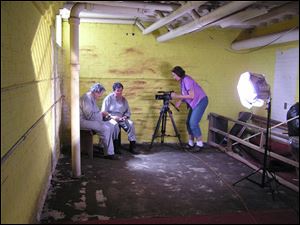
Nuns recall life under communism in film
6/19/2010
Lynn King films Sister Margaret Hall, left, and sister Nancy Ferguson as they eat a prison meal of oatmeal during a scene from 'Interrupted Lives' in the basement of Toledo St. Agnes Convent.
When the Berlin Wall came crashing down in 1989, the end of atheistic communism marked the dawn of a new era of religious freedom in Eastern Europe.
But along with the wall's collapse came the realization that religious groups had a long, tough road ahead if they were to overcome more than 40 years of oppression.
Many clergy and religious leaders who survived post-World War II communism emerged with harrowing tales to tell, stories that became the focus of the documentary Interrupted Lives: Catholic Sisters Under European Communism.
The movie will be shown Friday at Lourdes College in Sylvania.
Sister Judy Zielinski, a Sylvania Franciscan nun, filmmaker, and former Toledoan, said in an interview this week that she became involved in the project after getting a call from two American nuns who had spent time in Eastern Europe.
The nuns, Sister Margaret Nacke and Sister Mary Savoie of the Sisters of St. Joseph in Concordia, Kan., had responded to a plea from U.S. Catholic bishops asking priests and sisters to help rebuild the church in post-communist Eastern Europe.
“Imagine after 40 years of suppression, everything needed to be done at once,” Sister Judy said. “Catholic schools were closed, dirty, empty, or had been used for military barracks and warehouses. There were no desks, no school libraries. Seminaries had been blockaded or torn down. Hospitals and convents and monasteries were seized and closed or were used for different purposes. Religious had scattered everywhere.”
Sister Margaret and Sister Mary had collected testimonies of these “sister survivors,” as they called them, in which they told of being tortured, imprisoned, beaten, exiled to Siberia, or forced to labor on farms and in factories.
The Kansas nuns thought the stories should be told in a documentary, and eventually were referred to Sister Judy, a writer and producer for NewMedia Group based in South Bend, Ind.
Sister Judy, who has made hundreds of movies and TV programs, said she was interested, but also realized it would be a challenging task.
“The stories were all compelling, but it's a long way to get from these pages and pages of testimonies to the screen,” she said. “It definitely was the most challenging and the most rewarding film I've made.”
One problem was finding scholarly or expert material on the topic.
“This was very much uncharted territory, and at times I was terrified,” Sister Judy said. “I wanted to tell the stories but I wanted to do it accurately and honestly and give it the dignity that it deserved. It was just an overwhelming challenge.”
Sister Judy, 61, made two trips to Eastern Europe in 2007, interviewing 60 nuns in Romania, Slovakia, Hungary, Ukraine, and Lithuania. Interviews were conducted in eight languages.
Knowing she needed more than “a series of talking heads” to make the film visually interesting, she decided to re-enact some of the more dramatic stories, including nuns being beaten by guards, hiding “contraband” religious items, professing their vows in secret, working in factories, and sneaking across the border.
She used Catholic sisters rather than professional actors because she thought the nuns could empathize with their European colleagues. The re-enactments were filmed in Toledo and Sylvania in 2008, as well in Notre Dame and Mishawaka, Ind.
Sister Judy compiled 150 hours' worth of footage that she edited down to one hour for the film.
Among the 25 Franciscan nuns who played roles in Interrupted Lives was Sister Margaret Hall, who professed her vows in 1950.
Although she never acted before, Sister Margaret said she did not hesitate to help Sister Judy.
“First of all we were asked to volunteer, and we always try to help each other out in our projects,” she said. “An actor I am not. But you really had to enter into the story and do what the sisters were doing.”
She said Sister Judy was “marvelous” to work with because “she knows what she wants and she gets you to do it, and she's very gentle about it.”
Sister Judy said she was shocked by some of the sister survivors' stories, including those told by Sister Clara Laslau of Romania.
“When we interviewed Sister Clara, she was in her 90s, probably 90 pounds dripping wet. It was tantamount to meeting Mother Teresa,” Sister Judy said.
“She had worked for a bishop in Bucharest and the communists believed she had secret information on priests and bishops that were ordained,” she said. “They wanted to get the information out of her. They put her in prison for 14 years and she was severely beaten.
“The thought that these men would lock her in a room and beat her until something collapsed in her chest and blood came out of her mouth, it's unfathomable,” Sister Judy said.
The nun died shortly after she filmed her return to Romania's Jilava Prison, where she had been incarcerated.
Sister Judy said that while most Americans have cheerful images of the end of World War II, Interrupted Lives is a reminder that postwar life in Eastern Europe was brutally different, especially for Catholic nuns and other religious people who were oppressed by the communists. It was disturbing to think about the torture and abuse taking place as recently as 1989, Sister Judy said.
The documentary, produced on a budget of nearly $400,000, won a Gabriel Award earlier this month from the Catholic Academy for Communication Arts Professionals.
Contact David Yonke at:
dyonke@theblade.com
or 419-724-6154.